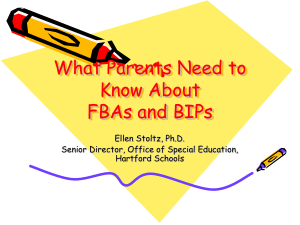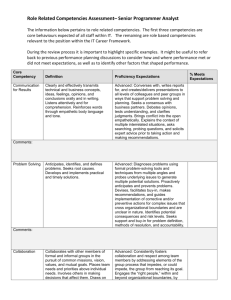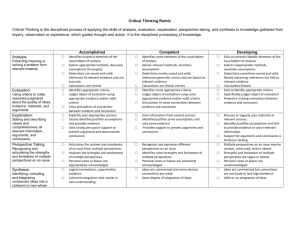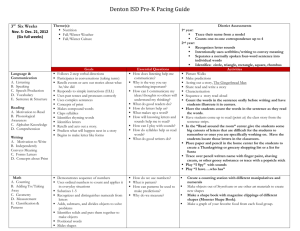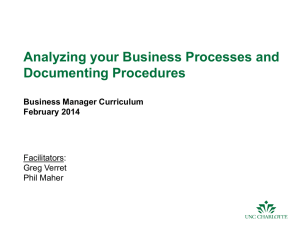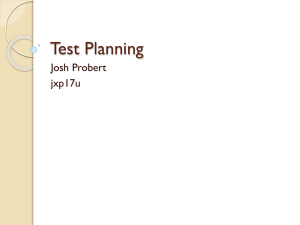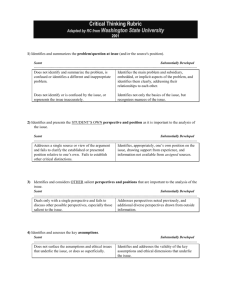Critical Thinking () - California State University, Northridge
advertisement
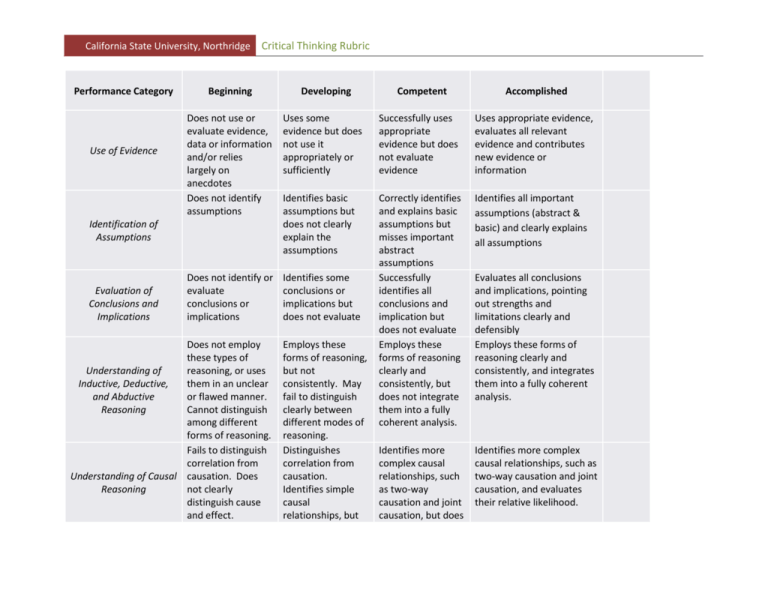
California State University, Northridge Performance Category Use of Evidence Critical Thinking Rubric Beginning Competent Accomplished Does not use or evaluate evidence, data or information and/or relies largely on anecdotes Does not identify assumptions Uses some evidence but does not use it appropriately or sufficiently Successfully uses appropriate evidence but does not evaluate evidence Uses appropriate evidence, evaluates all relevant evidence and contributes new evidence or information Identifies basic assumptions but does not clearly explain the assumptions Identifies all important assumptions (abstract & basic) and clearly explains all assumptions Does not identify or evaluate conclusions or implications Identifies some conclusions or implications but does not evaluate Correctly identifies and explains basic assumptions but misses important abstract assumptions Successfully identifies all conclusions and implication but does not evaluate Employs these forms of reasoning clearly and consistently, but does not integrate them into a fully coherent analysis. Identifies more complex causal relationships, such as two-way causation and joint causation, but does Identifies more complex causal relationships, such as two-way causation and joint causation, and evaluates their relative likelihood. Identification of Assumptions Evaluation of Conclusions and Implications Developing Does not employ these types of Understanding of reasoning, or uses Inductive, Deductive, them in an unclear and Abductive or flawed manner. Reasoning Cannot distinguish among different forms of reasoning. Fails to distinguish correlation from Understanding of Causal causation. Does Reasoning not clearly distinguish cause and effect. Employs these forms of reasoning, but not consistently. May fail to distinguish clearly between different modes of reasoning. Distinguishes correlation from causation. Identifies simple causal relationships, but Evaluates all conclusions and implications, pointing out strengths and limitations clearly and defensibly Employs these forms of reasoning clearly and consistently, and integrates them into a fully coherent analysis. California State University, Northridge Recognition of Relevant Distinctions Recognition of Relevant Commonalities Recognition and Communication of Own Perspective Critical Thinking Rubric not more complex ones. evaluate their relative likelihood. Compares sets of phenomena, recognizing some of the distinctions between or among them, not necessarily the relevant ones. Compares sets of phenomena, making note of some parallels or similarities, not necessarily the relevant ones. Compares sets of phenomena, recognizing the more obvious distinctions between or among them Compares sets of phenomena, recognizing and delineating the range of distinctions between or among them. Compares sets of phenomena, recognizing and delineating the range of relevant similarities and parallels between them. Aptly compares sets of phenomena, recognizing and accounting for the full range of relevant distinctions between or among them. May not identify their own perspective; may communicate own perspective using limited evidence, data, or arguments; may be prone to egocentric argument; has difficulty imagining other ways of seeing things. Identifies and communicates own perspective using evidence or arguments that may be lacking or with unclear details; somewhat able to place own view in perspective, but weakness in considering and critiquing the Identifies and communicates own perspective using some in-depth and personalized arguments and evidence; able to place own view in perspective with others; reasonably effective at considering and critiquing the Identifies and clearly communicates own perspective using solid arguments and evidence; makes subtle connections; makes own view more convincing by considering the merits of other perspectives; clearly explains the limits of their own perspective. Compares sets of phenomena, recognizing the most obvious similarities and parallels between or among them. Aptly compares sets of phenomena, recognizing and accounting for the full range of relevant similarities and parallels between and among them. California State University, Northridge Consideration of Alternative Perspectives Synthesis across Diverse Points of View Problem-solving Critical Thinking Rubric worth of each perspective, especially one’s own. Identifies and Identifies and makes beginning adequately attempts to addresses address alternative alternative perspectives perspectives No thesis or system Describes a vague is employed; tends thesis or system to list ideas without that is weak in synthesis; may connecting the reflect a bias or diverse points of lack of view; may understanding of misrepresent the the diverse points diverse points of of view and their view; synthesis may contexts. reflect a bias or lack of understanding of the diverse points of view and their contexts. Identifies and makes beginning attempts to use relevant approaches for solving problems Identifies and adequately uses relevant approaches for solving problems worth of each perspective including one’s own. Identifies and cogently addresses multiple and diverse alternative perspectives Develops and describes a reasonable thesis or system to help the reader connect and understand the diverse points of view; mostly maintains the accuracy of the diverse points of view while describing the linkages between them; demonstrates understanding of the diverse points and their contexts. Identifies and cogently uses relevant and innovative approaches for solving problems Identifies and comprehensively addresses multiple and diverse alternative perspectives Develops and describes a well thought out thesis or system to help the reader connect and understand the diverse points of view; maintains the accuracy of the diverse points of view while explaining the linkages between them; demonstrates fairness and an in-depth understanding of the diverse points of view and their contexts. Identifies and imaginatively uses relevant and innovative approaches for solving problems
